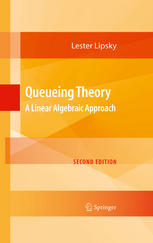

Most ebook files are in PDF format, so you can easily read them using various software such as Foxit Reader or directly on the Google Chrome browser.
Some ebook files are released by publishers in other formats such as .awz, .mobi, .epub, .fb2, etc. You may need to install specific software to read these formats on mobile/PC, such as Calibre.
Please read the tutorial at this link: https://ebookbell.com/faq
We offer FREE conversion to the popular formats you request; however, this may take some time. Therefore, right after payment, please email us, and we will try to provide the service as quickly as possible.
For some exceptional file formats or broken links (if any), please refrain from opening any disputes. Instead, email us first, and we will try to assist within a maximum of 6 hours.
EbookBell Team

4.4
102 reviewsQueueing Theory deals with systems where there is contention for
resources, but the demands are only known probabilistically. This book can
be considered as either a monograph or a textbook on the subject, and thus
is aimed at two audiences. It can be useful for those who already know
queueing theory, but would like to know more about the linear algebraic approach.
It can also be used as a textbook in a first course on queueing theory for
students who feel more comfortable with matrices and algebraic arguments than
with probability theory. The equations are well-suited to easy computation.
The text has much discussion on how various properties can be computed using any
language that has built-in matrix operations (e.g., MATLAB, Mathematica, Maple).
To help with physical insight, there are over 80 figures, numerous examples,
and many exercises distributed throughout the book.
There are over 50 books on queueing theory that are available today and
most practitioners have several of them on their shelves. Because of its
unusual approach, this book would be an excellent addition. It would also
make a good supplement where another book was selected as the primary text
for a course in system performance modelling.
This second edition has been greatly expanded and updated thoughout, including
a new chapter on semi-Markov processes and new material on representations
of distributions. In particular, there is much discussion of power-tailed
distributions and their effects on queues.
Lester Lipsky is a professor in the Department of Computer Science and
Engineering at the University of Connecticut.